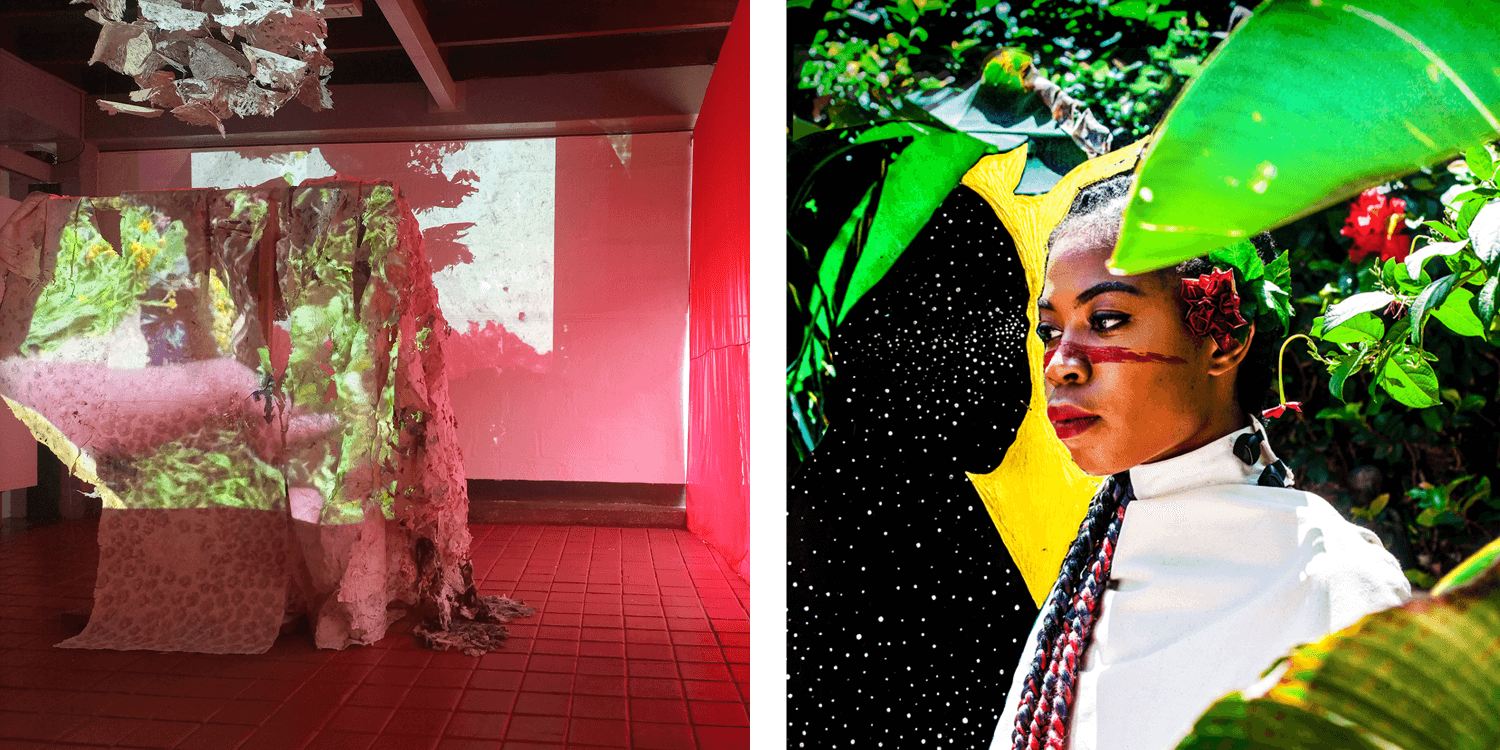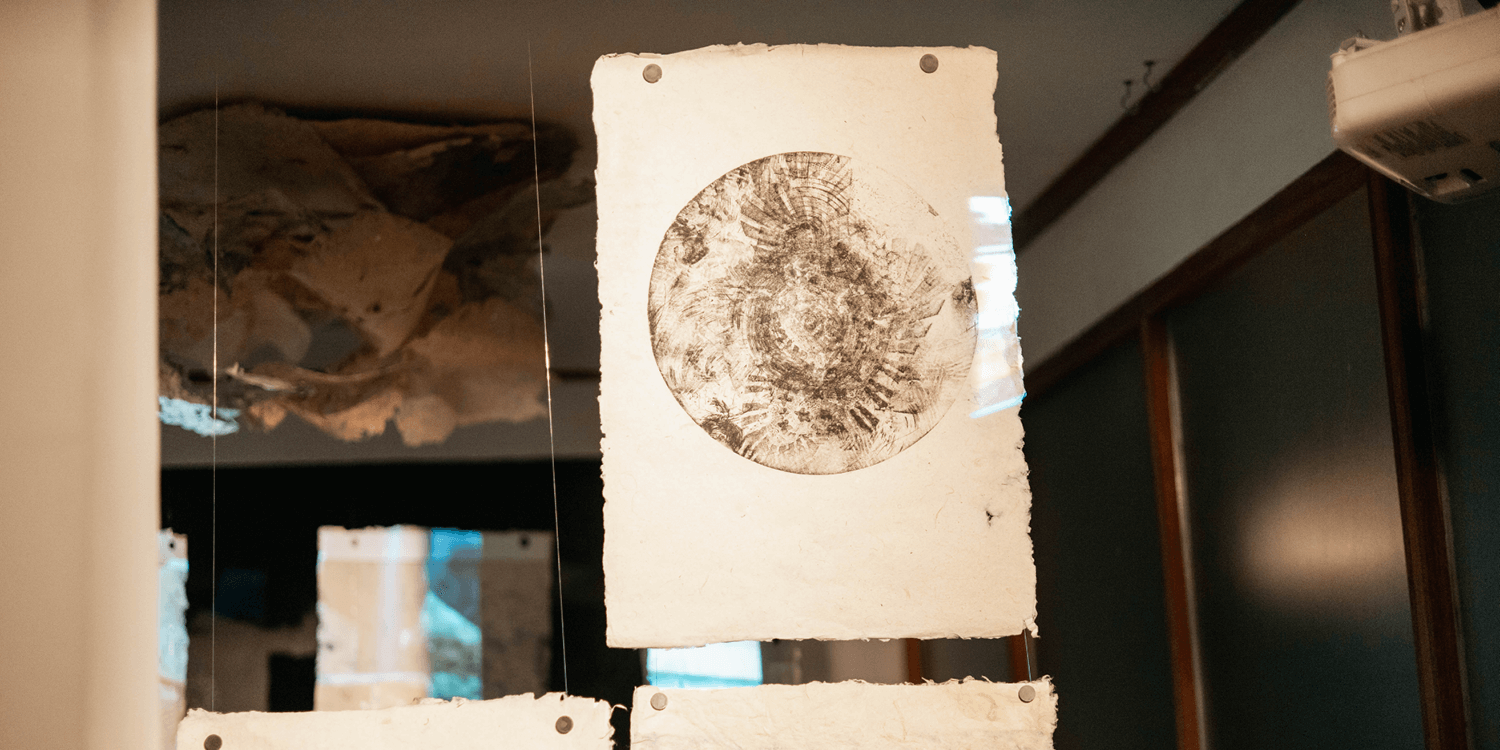G.A.S. Foundation is excited to introduce our second resident to join us this art season, Liz Kobusinge, a Ugandan researcher and multidisciplinary artist embarking on an immersive four-week residency in Lagos as part of the Annotations Programme - a six-month project that explores major African cultural festivals and their dual nature as historic events and repositories of postcolonial pan-African encounters. In her practice, which spans printmaking, installation, film, textiles, and ecology, Kobusinge demonstrates a commitment to selfhood, autonomy, and the preservation of traditional art-making practices. Her work envisions a future where both the earth and communities are nurtured to thrive, drawing on the rich heritage of eco-printing and bark cloth traditions.
During her residency, Kobusinge will delve deeper into her practice, spending ample time in the G.A.S. Library and Picton Archive enhancing her research-based approach to art-making. She hopes to immerse herself in the archives and engage with the local communities, all while remaining mindful of current continental, and particularly Nigerian, contexts. She hopes this engagement will foster meaningful conversations that link her experiences with broader narratives, allowing her to create works that honour preservation and contribute to the existing discourse.
 (L) A garden is a grave, 2024. Image courtesy of Liz Kobusinge. (R) Marithe, 2024. Image courtesy of Darlyne Komukama.
(L) A garden is a grave, 2024. Image courtesy of Liz Kobusinge. (R) Marithe, 2024. Image courtesy of Darlyne Komukama.
What is the current focus of your creative practice?
My current research is on the textured possibilities of eco-printing and painting methods on primarily bark cloth paper to build a body of work that positions memory as material. Bark cloth is made from the Mutuba tree, using centuries-old traditions mainly practised in Buganda, the central region of Uganda. Some of these trees are skinned several times in a sustainable process. These studies reference the paper-making techniques of Sheila Nakitende (Uganda), the eco-print experimentation of Tinyiko Makwakwa (South Africa), and the printing techniques of Sara-Aimee Verity (South Africa). I position my work as a performance of memory, exploring the hand-making of bark cloth paper as a ritual of remembrance, layering handmade dye, ink, and video to mimic how our skin holds and disperses memory. These memory studies include observing the degradation of the materials I engage with to ponder the varied materiality of memory set against the ephemera of living.
Work from this ongoing materials investigation is a multi-textural reflection of a multi-layered human experience, particularly in the context of familial bonds and genetic lineage. This evolving practice primarily concerns the tenets of selfhood and autonomy as I document myself and others ‘making peace’ as a way to live in and out of the margins. Art has been a way for me to cope with increasingly hostile systems. I value the connections that art-making has opened for me with other people, histories, the natural world, and both old and new working methods. I pursue this way of working as a contribution to preserving integral ways of art-making, as I actively participate in imagining radical futures where we nurture the earth and each other as a means of collective survival.
 Etchings on bark cloth and lint paper by Liz Kobusinge and Darlyne Komukama presented at In the Midst, the first exhibition to be realised as part of the Art Exchange: Moving Image programme.
Etchings on bark cloth and lint paper by Liz Kobusinge and Darlyne Komukama presented at In the Midst, the first exhibition to be realised as part of the Art Exchange: Moving Image programme.
What drew you to apply for this residency and how do you think it will inform your wider practice?
As part of the 2023/2024 cohort of the Njabala Foundation, I contributed to Pillars of Rectitude, a research project that foregrounds East African women artists whose work has undergone systematic erasure. This research evolved into It Will Be: Radical Revision and Rebeka Njau, a paper I presented earlier this year in Kampala during the AWARE symposium (Tracing a Decade: Women Artists of the 1960s in Africa). This research deepened my interest in the intersections of Pan-African art movements, particularly during the 1960s and 1970s. The call for this residency at G.A.S. Lagos felt like an invitation to lean further into those histories while in thoughtful company, in a setting that promises varying layers of access. I know that creating work alongside artists and researchers with different points of reference and methods of working, while in proximity to these physical archives, will enrich my practice immensely. As this program opens my thinking and writing to different perspectives outside my geographic and professional comfort zones, I hope to connect with other artists and researchers in a format that feels crucial at this moment.
 Untitled, Memory Project. Image courtesy of Olivia Botha.
Untitled, Memory Project. Image courtesy of Olivia Botha.
Can you give us an insight into how you hope to use the opportunity?
This residency's access and support, with a dedicated library that includes the Picton Collection archive materials, promises to be a transformative event for my research practice. I am eager to focus my creative energies on collaborative learning and unlearning to enhance my language of expression. A period of structured research, creative exploration, and critique at this residency in Lagos will spark growth and expansion. I plan to use this supported time as part of the Annotations Programme at G.A.S. to develop a practice that relies on research as a central function of considered art-making. I want to visit as many places as possible and explore diverse approaches to making art. As a community-taught artist, I am always eager to learn wherever I can. I want to engage with the knowledge in this place as I create work that honours what has been preserved and contributes to the existing narrative. I aim to listen to the archives at G.A.S. and the surrounding community and to feel the marks we leave on each other.
RESIDENCY ARCHIVE
EVENT: École du Festival Study Day
Event Date: 7th November, 2024
On November 6th G.A.S. Foundation hosted École du Festival, a collaborative and experimental Study Day focused on re-examining and reactivating the cultural, political, and artistic legacies of pan-African festivals. Organised in the framework of G.A.S. Foundation’s Annotations programme, the Study Day served as a site for critical dialogue between artists and researchers working on pan-African festivals and the interested public. This event was segmented into two sessions each offering a space for in-depth exploration and discussion.
 Audience participation in the courtyard, where volunteers engage in a text-photo association choreography led by Liz Kobusinge and Theophilus Imani at École du Festival Study Day, Session Two, presented on 6th November 2024.
Audience participation in the courtyard, where volunteers engage in a text-photo association choreography led by Liz Kobusinge and Theophilus Imani at École du Festival Study Day, Session Two, presented on 6th November 2024.
ABOUT LIZ KOBUSINGE
Liz Kobusinge is a community-taught artist who positions the textured possibilities of eco-printing and painting methods on hand-made bark cloth paper as a ritual of remembrance, layering paper, dyes, ink and video to mimic how our skin holds and disperses memory.
Kobusinge work has been exhibited with the Njabala Foundation for their annual exhibition at the Makerere University Art Gallery, as part of KLA ART 2021 in Kampala, with the Salooni Collective at Institut National de Formation Artistique et Culturelle in Burkina Faso and the N’GOLA Biennial of Arts and Culture in São Tomé e Príncipe, with 32 Degrees East for their members’ exhibition and with poet Gloria Kiconco for Return to Sender in Kampala.

ABOUT ANNOTATIONS
Annotations is a six-month project that explores major African cultural festivals and their dual nature as historical events and repositories of postcolonial pan-African encounters. Led by co-curators Naima Hassan (Picton Archivist) and Maryam Kazeem (iranti press), Annotations will spark innovative approaches towards archival research by engaging the complex histories of FESMAN, PANAF, Zaire 74, and FESTAC’77
Supported by Outset Contemporary Art Fund.
